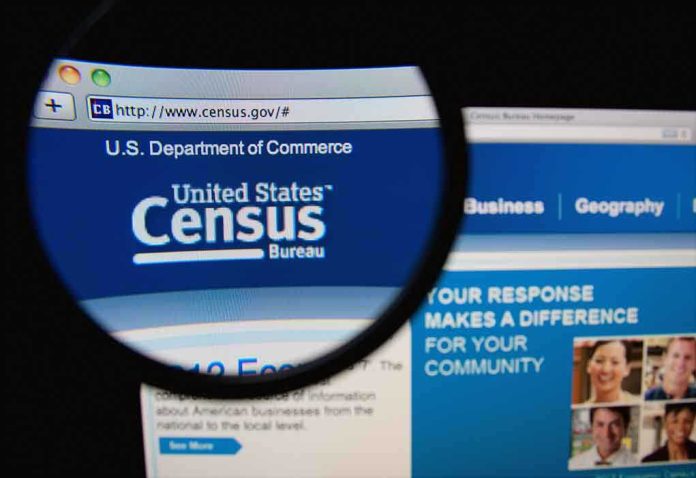
Republican lawmakers are pushing to exclude illegal immigrants from the census count for congressional districts, setting the stage for a fierce battle over political power and the future of fair representation in America.
Story Snapshot
- Republicans have reintroduced the Equal Representation Act to require a citizenship question and exclude unauthorized immigrants from census-based apportionment.
- The debate centers on whether counting non-citizens inflates political power and federal resources for states with large immigrant populations.
- Democrats and immigrant advocates argue this move undermines constitutional principles and threatens fair representation for all communities.
- Expert research shows the real shift in House seats and Electoral College votes may be smaller than political rhetoric suggests.
Republicans Renew Push to Change Census Counting Rules
In June 2025, Republican senators, led by Bill Hagerty and Mike Crapo, reintroduced the Equal Representation Act to require the U.S. Census Bureau to include a citizenship question and to exclude unauthorized immigrants from counts used to allocate seats in the House of Representatives and Electoral College votes. Supporters argue that the current system unfairly rewards states with large unauthorized immigrant populations, diluting the political voice of American citizens and distorting federal funding formulas.
This legislative push follows years of heated debate, including the Trump administration’s unsuccessful 2020 effort to add a citizenship question, which was blocked by the Supreme Court. With unauthorized immigrant numbers rising in states like California and Texas, Republicans contend that counting non-citizens for apportionment undermines the principle of one citizen, one vote, and incentivizes policies that encourage illegal immigration. The renewed debate has reignited partisan tensions, with each side framing the issue as fundamental to the future of American democracy.
Constitutional and Historical Context of the Census Debate
The U.S. Constitution mandates a census every ten years to apportion seats in Congress based on the “whole number of persons” residing in each state, without specifying citizenship. Historically, the census has always counted all residents, regardless of immigration status. Efforts to change this practice have grown alongside increasing immigration and heightened political polarization. Critics of the new Republican legislation warn that excluding non-citizens would reverse centuries of census tradition and could force legal showdowns over the meaning of constitutional representation.
The last major attempt to directly alter census methodology came in 2020, when the Supreme Court struck down the Trump administration’s proposed citizenship question. Since then, population estimates and the growing presence of unauthorized immigrants in key states have kept the issue at the forefront of national politics, especially as redistricting and apportionment directly impact the balance of power in Congress and the Electoral College.
Stakeholder Interests and Partisan Divisions
Republican lawmakers assert that states with large unauthorized immigrant populations gain disproportionate representation and federal resources at the expense of states with fewer immigrants. They argue this distorts the nation’s political map and undermines the voting power of citizens, highlighting concerns about fairness and integrity in the electoral process. Democratic officials, along with immigrant rights advocates, counter that counting all residents aligns with constitutional intent and ensures fair representation for diverse communities, regardless of citizenship status.
The U.S. Census Bureau, tasked with implementing any legislative changes, would face significant logistical and legal challenges if required to exclude unauthorized immigrants. State governments, particularly those in California, Texas, New York, and Florida, have high stakes in the outcome, as potential shifts in congressional seats and federal funding could reshape their political influence for the next decade.
Legal, Political, and Practical Implications
If the Equal Representation Act passes, legal challenges are expected, with courts asked to weigh in on the constitutional meaning of “persons” and the rights of states versus federal authority. In the short term, states may face uncertainty in their redistricting processes, while litigation could delay or complicate census data release and apportionment decisions. In the longer term, excluding non-citizens could alter the distribution of House seats and Electoral College votes, likely reducing representation for states with sizable immigrant populations and shifting political power toward others.
However, peer-reviewed research indicates that the practical effect of excluding unauthorized immigrants may be less dramatic than rhetoric suggests—typically shifting no more than two House seats and three Electoral College votes in any given decade since 1980. Despite this, the political stakes remain high, with both parties viewing the census as a battleground for the future of American governance and representation.
Ultimately, the ongoing debate highlights deep divisions over immigration, federalism, and the interpretation of the Constitution. As the Equal Representation Act moves through Congress, its fate—and its impact on American political life—will hinge on both legislative maneuvering and judicial review. The outcome will shape not only the next round of redistricting but the foundational principles of representation and citizenship in the United States for years to come.
Sources:
Illegal immigrants potentially counted in US census take center stage in redistricting battle
Peer-reviewed academic research on congressional apportionment and undocumented immigrants




